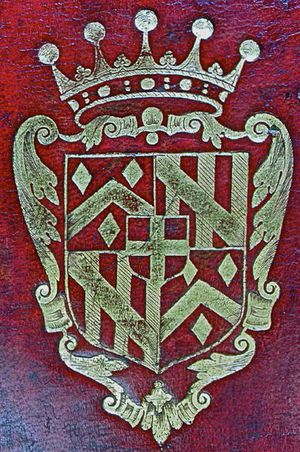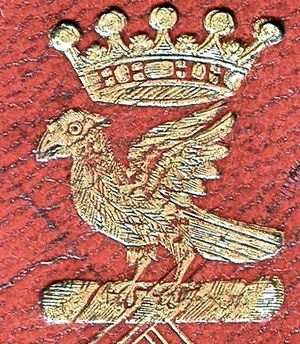Difference between revisions of "Edward Hyde 1609-1674"
(Created page with "===name::Edward name::HYDE, 1st personal Title::Earl of Clarendon date of Birth::1609-date of Death::1674=== ====Biographical Note==== Born at place of...") |
m (Evelyn link) |
||
| (23 intermediate revisions by 4 users not shown) | |||
| Line 1: | Line 1: | ||
| − | ===[[name::Edward]] [[name::HYDE]], 1st [[personal | + | __NOTITLE__ |
| + | ===[[name::Edward]] [[name::HYDE]], 1st [[personal title::Earl of Clarendon]] [[date of birth::1609]]-[[date of death::1674]]=== | ||
| + | [[File:HydeEdward1.jpg| thumb | Armorial stamp of Edward Hyde (British Armorial Bindings) ]] | ||
| + | [[File:HydeEdward2.jpg| thumb | Armorial stamp of Edward Hyde (British Armorial Bindings) ]] | ||
====Biographical Note==== | ====Biographical Note==== | ||
| − | Born at [[place of | + | Born at [[place of birth::Dinton, Wiltshire]], son of [[family::Henry Hyde]], gentleman. BA [[education::Magdalen Hall, Oxford]] 1626, admitted [[organisations::Middle Temple]] 1626 ([[occupation::barrister]], 1633). Developed a successful legal career; [[occupation::MP]] for [[location::Wootton Bassett]], 1640. Became increasingly involved in royal affairs as a drafter of documents for the King; knighted, and appointed to the Privy Council , 1643. Moved to [[location::Jersey]] with [[associates::Prince Charles]] 1646, moved to the continent 1648 and spent the Interregnum involved in a range of diplomatic and political activities as a close [[occupation::advisor]] to Charles. [[occupation::Lord Chancellor]] 1658, created [[personal title::Earl of Clarendon]] 1661; [[occupation::Chancellor]] of [[organisations::University of Oxford|Oxford University]], 1660. Dismissed from office 1667, moved in exile to [[location::France]] where he died. His [[book title::''History of the rebellion'']] was first published in [[date of publication::1702]]-[[date of publication::1704|04]]. |
====Books==== | ====Books==== | ||
| − | + | Hyde was an active acquirer of books throughout his legal and political career. He is known to have considered purchasing [[crossreference::John Williams]]’s library when it was sequestered in 1637. His pre-Civil War library was seized in 1643 but ultimately returned to him in 1660. During his years abroad, travelling with the exiled court, his correspondence reveals constant activity in obtaining books, often bought for him by diplomatic contacts across Europe. He returned from a mission to [[location::Spain]] in 1648 with “three trunks and a cabinet” of [[language::Spanish]] books. Developed a liking for French bindings while abroad, and tried to persuade his Parisian binder to move to [[location::England]] in 1660; later known to have patronised the [[location::London]] binder [[associates::William Nott]]. [[crossreference::John_Evelyn_1620-1706|John Evelyn]] recorded “a very ample library”, furnished with portraits, when he visited [[location::Clarendon House]] in [[location::London]] in 1667. The library passed to his son [[subsequent owner::Henry Hyde|Henry]], 2nd [[personal title::Earl of Clarendon|Earl]] when he died, who added to it substantially, before much of the combined collection was sold at [[auction::auction]] in [[date of auction::1709]]. [[format::manuscript|Manuscripts]] from the collections of the first three Earls of Clarendon were sold at [[auction::auction]] in [[date of auction::1764]]. Examples: National Art Library Clements W2; Christie’s 16.12.1991/183. | |
====Characteristic Markings==== | ====Characteristic Markings==== | ||
| − | + | Used three armorial stamps, one incorporating the family arms, and two smaller ones using the crest. | |
====Sources==== | ====Sources==== | ||
| Line 17: | Line 20: | ||
*Hardacre, P. Portrait of a bibliophile: I: Edward Hyde, ''The Book Colletor'' 7 (1958), 361-8. | *Hardacre, P. Portrait of a bibliophile: I: Edward Hyde, ''The Book Colletor'' 7 (1958), 361-8. | ||
*Seaward, Paul. [https://doi.org/10.1093/ref:odnb/14328 "Hyde, Edward, first earl of Clarendon (1609–1674), politician and historian."] ''Oxford Dictionary of National Biography''. | *Seaward, Paul. [https://doi.org/10.1093/ref:odnb/14328 "Hyde, Edward, first earl of Clarendon (1609–1674), politician and historian."] ''Oxford Dictionary of National Biography''. | ||
| + | *[https://celm-ms.org.uk/introductions/ClarendonEdwardHyde.html Edward Hyde, ''Catalogue of English Literary Manuscripts 1450-1700'']. | ||
</div> | </div> | ||
| Line 24: | Line 28: | ||
[[Category:Aristocracy]] | [[Category:Aristocracy]] | ||
[[Category:Earls]] | [[Category:Earls]] | ||
| − | [Category:Members of Parliament]] | + | [[Category:Members of Parliament]] |
[[Category:Armorial Stamps]] | [[Category:Armorial Stamps]] | ||
| + | [[Category:Libraries Sold at Auction]] | ||
| + | [[Category:All Owners]] | ||
Latest revision as of 05:59, 27 March 2022
Edward HYDE, 1st Earl of Clarendon 1609-1674
Biographical Note
Born at Dinton, Wiltshire, son of Henry Hyde, gentleman. BA Magdalen Hall, Oxford 1626, admitted Middle Temple 1626 (barrister, 1633). Developed a successful legal career; MP for Wootton Bassett, 1640. Became increasingly involved in royal affairs as a drafter of documents for the King; knighted, and appointed to the Privy Council , 1643. Moved to Jersey with Prince Charles 1646, moved to the continent 1648 and spent the Interregnum involved in a range of diplomatic and political activities as a close advisor to Charles. Lord Chancellor 1658, created Earl of Clarendon 1661; Chancellor of Oxford University, 1660. Dismissed from office 1667, moved in exile to France where he died. His History of the rebellion was first published in 1702-04.
Books
Hyde was an active acquirer of books throughout his legal and political career. He is known to have considered purchasing John Williams’s library when it was sequestered in 1637. His pre-Civil War library was seized in 1643 but ultimately returned to him in 1660. During his years abroad, travelling with the exiled court, his correspondence reveals constant activity in obtaining books, often bought for him by diplomatic contacts across Europe. He returned from a mission to Spain in 1648 with “three trunks and a cabinet” of Spanish books. Developed a liking for French bindings while abroad, and tried to persuade his Parisian binder to move to England in 1660; later known to have patronised the London binder William Nott. John Evelyn recorded “a very ample library”, furnished with portraits, when he visited Clarendon House in London in 1667. The library passed to his son Henry, 2nd Earl when he died, who added to it substantially, before much of the combined collection was sold at auction in 1709. Manuscripts from the collections of the first three Earls of Clarendon were sold at auction in 1764. Examples: National Art Library Clements W2; Christie’s 16.12.1991/183.
Characteristic Markings
Used three armorial stamps, one incorporating the family arms, and two smaller ones using the crest.
Sources
- The Ware-Clarendon manuscripts, Bodleian Library Record 6 (1960), 586-7.
- Alston, R. C. Inventory of sale catalogues 1676-1800. St Philip, 2010.
- Gwynn, L. The architecture of the English domestic library, 1600-1700, Library & Information History 26 (2010), 56-69.
- Hardacre, P. Portrait of a bibliophile: I: Edward Hyde, The Book Colletor 7 (1958), 361-8.
- Seaward, Paul. "Hyde, Edward, first earl of Clarendon (1609–1674), politician and historian." Oxford Dictionary of National Biography.
- Edward Hyde, Catalogue of English Literary Manuscripts 1450-1700.

